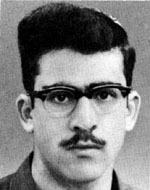Antebi, Aharon (Roni)
Son of Rahamim and a nun. He was born on August 26, 1946 in Jerusalem. During the War of Independence, he was rescued from his mother when she was hit by Jordanian snipers – and he was at a young age. Until the age of six, Aharon was educated in the “WIZO” children’s home. Afterward, he continued his studies at the “Or HaChaim” Talmud Torah, and completed them with great success. After graduating from high school, he moved to a yeshiva in Ra’anana, but because of his strong desire to be close to his father, he moved to the Marom Zion High School a year later, where he excelled and liked all his teachers. When he completed his studies he sought to combine his military service with pedagogic education, since he saw his future as a teacher. To this end he decided to continue his studies at the Torah-pedagogic institute at the “Hadarom” yeshiva in Rehovot. At the same time, he began to serve in the religious Nahal Brigade, which was in August 1966, and his commanders praised him for his exemplary behavior, and was a “yeshiva student,” in his full sense of the word, systematic in his role and guided with a consistent love of Torah study and mitzvot. He had a strong desire for a mother’s love, which he did not receive, and his father felt a sense of unqualified devotion, and Aharon began studying at the Hebrew University in the Faculty of Economics and Political Science, In addition to his studies, he became a teacher and instructor in the yeshiva The “Mativta Maharashal” high school in Jerusalem. From time to time he went to reserve duty and during the days of alert before the Six-Day War he was called back to the flag. In the battle at Armon Hanatziv in Jerusalem, when he dealt with a small forested hilltop, he was hit by a sniper’s bullet. It was on the third day of the fighting, on the 28th of Iyar 5727 (7.6.1967). He was laid to rest in the military cemetery on Mount Herzl in Jerusalem. Aharon was one of the seventeen “fighters” who, according to their commander, “had the right to open the way for the liberation of Jerusalem and to begin the commandment to grant Israel full Jerusalem.” A list was presented in the memorial book dedicated to the graduates of the youth village in Jerusalem who gave their lives on the altar of the nation. A pamphlet in his memory appeared after they fell in the name of “On Your Plays”. In the book “Nizkor”, published by the Hebrew University of Jerusalem and the Student Union, edited by Yehuda the Civil, his history and description of his last sacrifice were presented.
